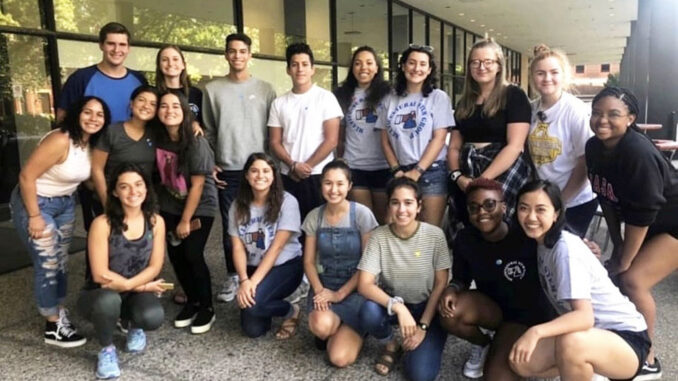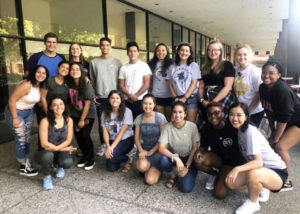

Katia Faroun | Features Editor
09/10/2020
As students of a less-than-diverse field, the members of Duquesne’s Multicultural STEM Group devote themselves to continuing a conversation on diversity and its essential place in the sciences.
The Multicultural STEM Group (MSG) is just what it sounds like: a club for STEM students of all backgrounds to come together, share resources and be a little bit nerdy. But more than just a professional academic club, MSG acts as a safe space for students who sometimes feel alienated within their majors, on campus or within the field of STEM as a whole.
Intent on creating a safe and accepting environment for students, the club is dedicated to welcoming all STEM students, regardless of race or ethnicity. Its mission is to create an “environment for minorities to go to in which they can find other people like them with the same interests and same relative career goals,” according to Kezia Jemison, a junior biochemistry major and president of the club.
“You come together by this one common thing, but then you stay together by so many other common things,” Jemison said.
The club was started by Phillip Palmer, assistant dean of the Bayer School of Natural and Environmental Sciences, with the objective of “increasing the underrepresented population within our school.” The goal was to change the culture of the Bayer School to be more inclusive and diverse, and the club aims to achieve that at an undergraduate level.
MSG recognizes that diversity is lacking in the STEM field, and their presence on a predominantly white campus allows them to foster diversity before entering the field. However, Jemison emphasized that the club isn’t only for students of color, and that STEM students of all backgrounds are encouraged to join the group.
“It is a place where we respect each other’s differences, but we also acknowledge them, and we build from there,” Jemison said.
For Razi Santos, a senior biology major and the club’s chair for peer mentoring, MSG provides more than just opportunities to further her studies. As an Asian woman from California, she has often felt out of place on campus, but her involvement in MSG encourages her to speak up about the importance of being different.
“It’s important for me to realize that I can take this opportunity — that there are different communities and I need to figure out ways to educate and inform them on how to be more welcoming to other people,” Santos said.
In addition to offering a safe space for STEM students of every color and background, the club is also a way for undergraduates to volunteer, build networking and find research opportunities. During each meeting, members discuss different ways to remain active in the community and find research opportunities on and off campus. They also encourage each other to apply for summer internships and find ways to build their resumes.
In order to draw in students, MSG partners with the Bayer School of Health Sciences’ peer mentoring program. The program is designed to reach out to incoming students, pair them up with a student mentor from the school and help the incoming student adjust to college life and a rigorous academic schedule. If it wasn’t for the peer mentoring program, both Jemison and Santos wouldn’t have joined MSG their freshman year and wouldn’t have received the support they needed as STEM students.
“Being a student in STEM already is hard, but also feeling like an outsider and feeling like you don’t really have anyone to back you up or support you is also really difficult,” Jemison said.
The essence of the club, according to Jemison, is found in the last few minutes of its meetings, when members have “critical conversations” relating to diversity in STEM and on campus. In these moments, members are able to ask about and discuss topics that they are passionate about, such as the LGBTQ+ community in STEM or implicit bias they’ve witnessed on campus.
“Having these kinds of discussions with our members makes us really realize that we’re not going through these things alone,” Jemison said. “It’s not just you, it’s everyone. It happens and it exists and the only way that we can move on and progress is by acknowledging it, talking about it and figuring out a way to get past it.”
Next on the agenda for the club is solidifying its partnership with the peer mentoring program and adapting its meetings and activities to be COVID-friendly. As the club faces practical and logistical changes posed by the pandemic, the purpose of the group remains the same.
“You don’t really know what’s happening in people’s lives until they tell you, and you can’t really compare those experiences either,” Jemison said, “so you just have to absorb that, take it in for what it is, and reflect on how or if you can do anything to help the person, or just help prevent something like that from happening again. Again, just fostering a more positive environment for everyone. That’s all anyone ever really wants.”
Those interested in joining MSG can email duq.msg@gmail.com or visit the club’s page on Campus Link.




